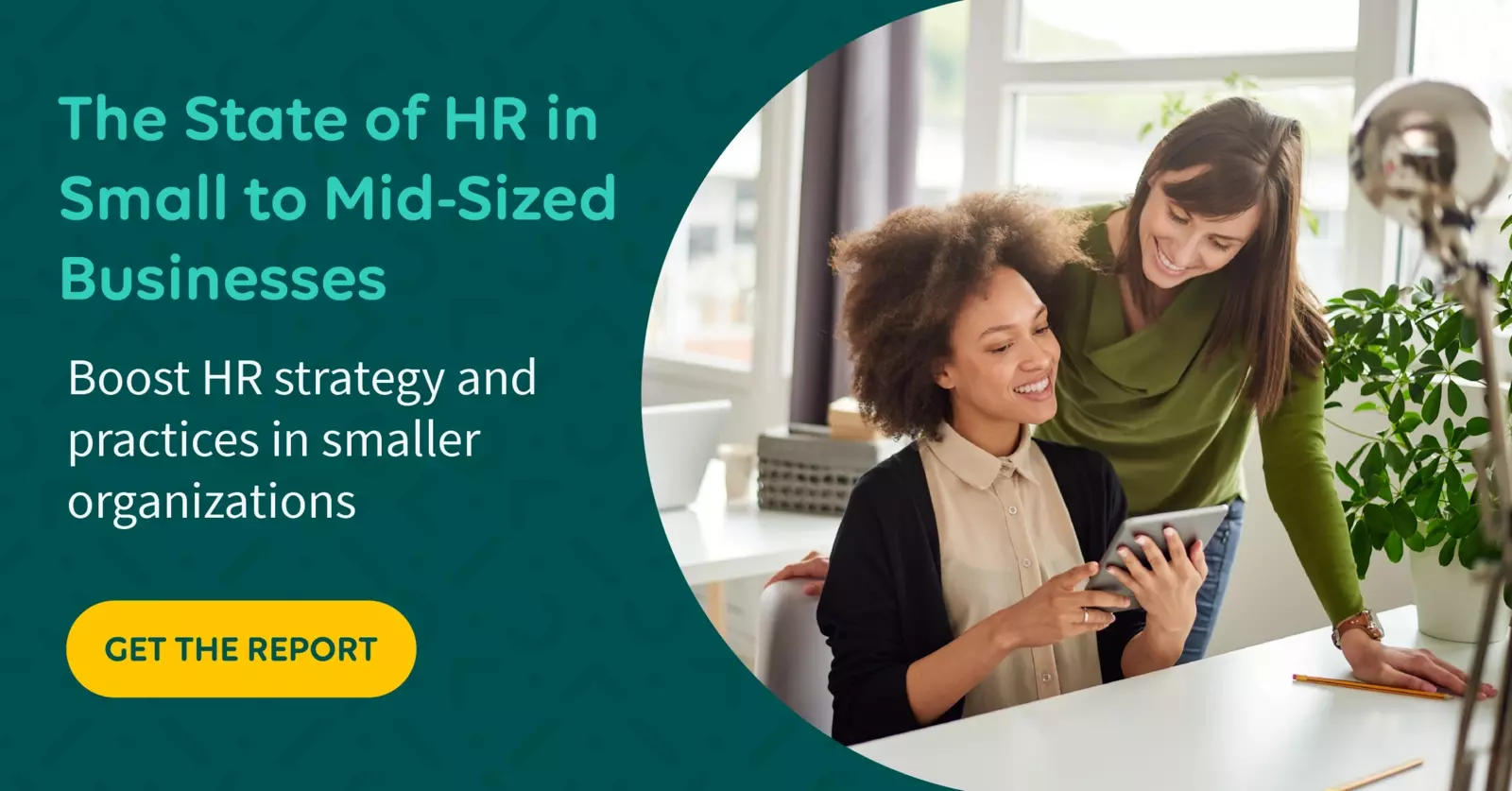To say that it's been a rough year and a half or so for small to mid-sized businesses (SMBs) is probably the understatement of the century. In fact, for a while during the peak of the pandemic SMBs were closing at twice the rate of larger organizations. Facing constant reductions in resources, HR teams at smaller organizations have had to adapt on the fly and think on their feet to keep things afloat.
And now that we're starting to see a recovery, life hasn't gotten any easier for HR pros at SMBs. Employee expectations have changed greatly and people are no longer willing to take the same old hourly shifts with the same old minimal benefits and lack of flexibility, leading to resources still being spread thin even with companies reopening and returning to more standard working conditions. What we've learned is that in the SMB space, a stand-out culture and competitive compensation and benefits are no longer "nice to haves" — they're essential for survival. So what can HR do about it?
We set out to find some concrete answers for you, and I'm happy to report our efforts are starting to pay off. Working with our partners at HR.com, we took a comprehensive look at the state of the HR function in small to mid-sized businesses and uncovered some critical focus areas that can help HR maximize their impact and get the tools needed to succeed in the modern work landscape — even without the same level of resources that bigger companies have. Let's explore.

Get automated
I know, shocker, the guy writing the blog for the tech company leads with automating HR processes. I promise there's a good reason, though, and I've got data to back it up. To start, this isn't about automating away HR or other roles within the organization. It's about giving you back the thing you need most if you're going to make the kind of impact that boosts HR's influence with your people and your business leaders — time.
Our research found that 60 percent of the SMB HR professionals we surveyed said they either only had some specific solutions automating certain processes at their organization or had no automation at all. In fact, 15 percent said they still use all manual or paper-based processes. In these kinds of environments it becomes really easy for HR to get sucked down the rabbit hole of just keeping back-office processes running or stuck dealing with inconsistencies and errors instead of making meaningful moves forward.
The effect lack of automation has on HR's available time truly is profound, especially when it comes to keeping up with compliance. For instance, we discovered that 34 percent of our survey group said they spend more than a quarter of their time managing regulatory compliance. That's 10 hours or more out of a standard 40-hour workweek.
So how do we fix it? Well, as much as we'd like it to be true, HR technology can't just be used as a Band-Aid, so getting to the right automation solution requires a quick evaluation of your particular organizational environment to ensure you set up something that works for HR, payroll, your people, and business stakeholders. Start by asking some key questions:
- Where are we spending the most time in HR?
- Where are our employees spending the most time? Is it on tasks meaningful for their roles or administrative process?
- How many different places do we have to go to get a full picture of our business objectives and our employee life cycle?
- What are our company's strategic goals for the future, and are our technology solutions able to help meet those?
- How do we get an understanding of our people's needs to inform how we set up our solutions?
Use data proactively
Something else that consolidating and automating your HR processes unlocks is a new perspective on your people data. Right now we know that over half of the HR people we surveyed, 54 percent, either take a reactive approach to people-related data or don't use it at all. What's even more concerning, though, is 71 percent say it's not very easy for their SMB's leadership team to tie people data and HR results to the larger goals and initiatives the company has. The good news is that with smart HR technology investments it doesn't have to be that way.
I know people analytics can often start sounding very complicated very fast, especially when you're wearing a lot of hats at a smaller organization and can barely figure out how to squeeze getting those kinds of insights into your schedule. But that's why when you're figuring out what tools you need you should make sure to invest in ones intelligent enough to serve up the insights you need right when you need them to make strong, proactive decisions. You guessed it, here are some more questions to ask:
- Do I have to go searching for relevant information, or do my HR tools deliver it to me even before I have a question?
- Do I have to look at the metrics I'm seeing and go with my gut as to what to do next, or do I get quick recommendations on next steps?
- Am I typically going line by line through tables of data and sharing relevant parts with other stakeholders, or can I easily get guidance to build charts and dashboards that tell that story quicker and can be automatically shared with the right people?
- How well does the data I see match up against the goals my executive team is tracking?
Build trust while saving time
A huge part of what the modern workforce is expecting in the post-pandemic workplace is a firm sense of trust and transparency. What's cool about this is there's a way to build those kinds of relationships and establish a stand-out culture while also taking a few things off of HR's plate — employee and manager self-service.
This idea isn't new, but it's apparently still something HR pros at SMBs sorely need. In 40 percent of the organizations we surveyed, HR spends more than a quarter of their time doing tasks that could be accomplished through employee self-service. If you're keeping track, that means according to our results in some cases half of HR's time is split between issues employees could likely handle with the right tools and dealing with compliance. That's a massive burden
So where are there opportunities to roll out self-service options? Luckily we've got data for that too from both an employee and manager perspective. Two-thirds of our respondents say it's not very easy for employees to swap shifts or get performance ratings. On the manager side, the top issues are understanding and reporting on team data and reviewing performance.
As we touched on before, it's critical to think about your impact on your people as you automate processes, not just operational efficiency. Scheduling is a great example — think about how you can deliver schedule and shift swap options to employees anytime, anywhere and make it easy for managers to approve those changes. Performance should be similar, and should be an ongoing dialog between managers and employees on any device. This level of flexibility is a big differentiator culturally, helps employees and managers feel they have ownership over their roles at your company, and frees HR up to focus more on strategy in the bargain.
Conclusion: Show HR's true value to leaders
Of course, none of these many improvements HR can make at SMBs to catapult them in the future can happen without something else happening first — convincing company leadership. This was the area of our survey where we uncovered perhaps the most stunning set of statistics:
- Nearly one in three HR teams wait to be told business strategy
- 31 percent say HR and payroll processes are aligned with each other but not operational or business goals, and 20 percent say HR and payroll processes are even disconnected from each other
- More than a quarter say leadership rarely or never views HR and payroll as strategic functions
It's time to change this perception of HR, demonstrate value leaders will understand, and ensure you're set up to make the largest impact possible. I invite you to join our SMB HR expert, Julie Develin, for a webinar where we'll get into more detail on our research with HR.com and give practical advice on how you make the case to your executive team for the tools and processes you need to succeed.



